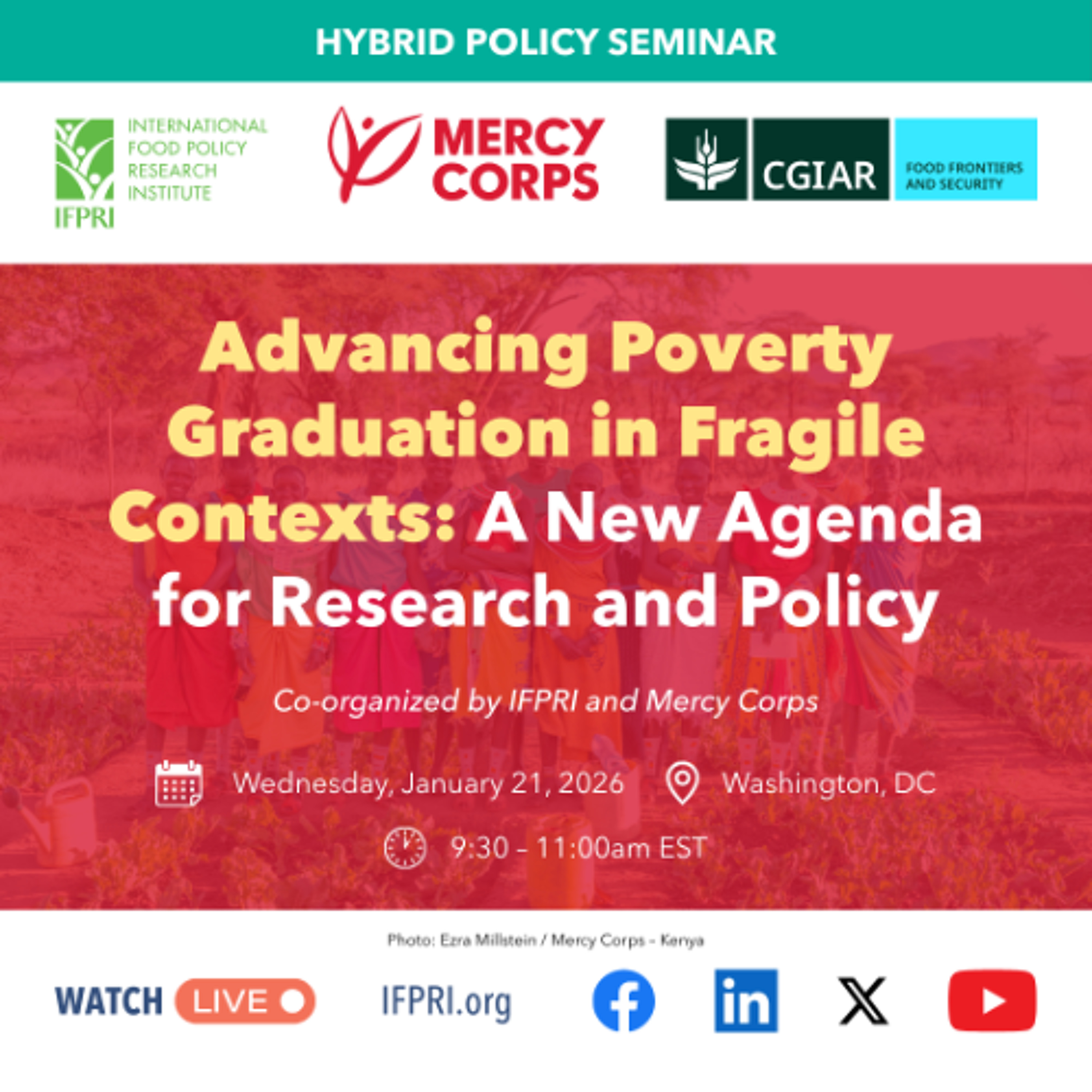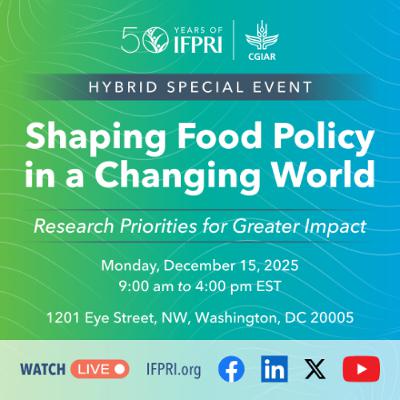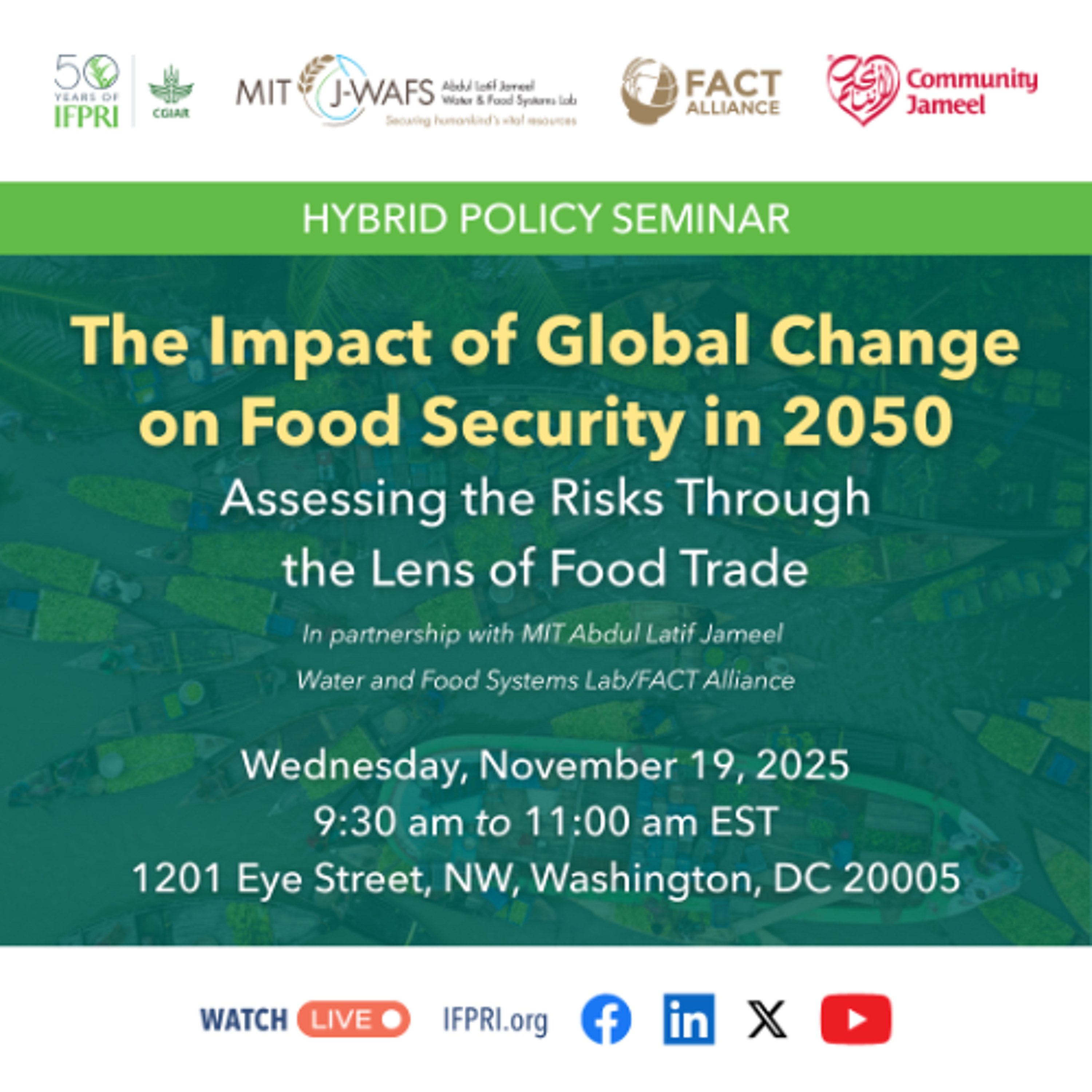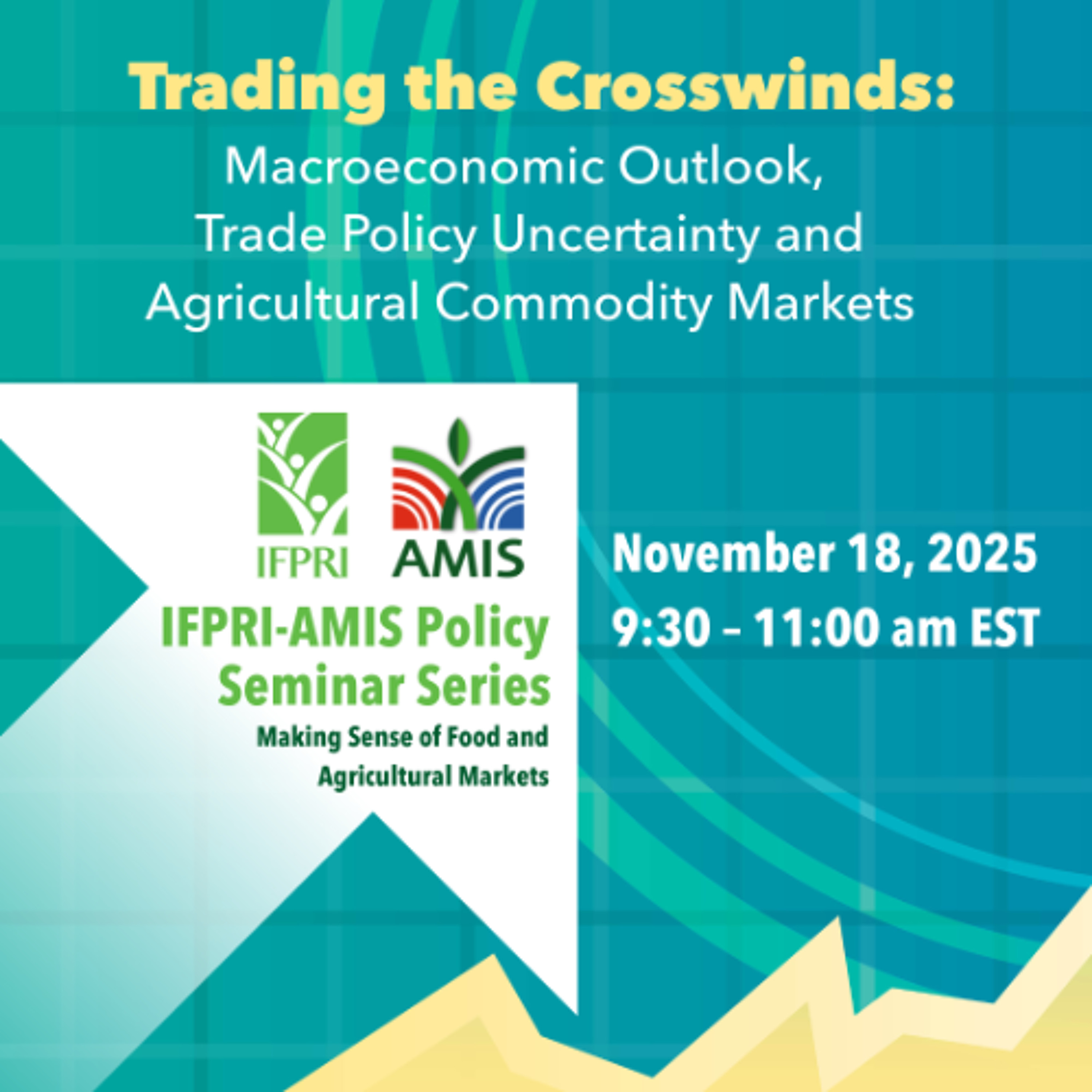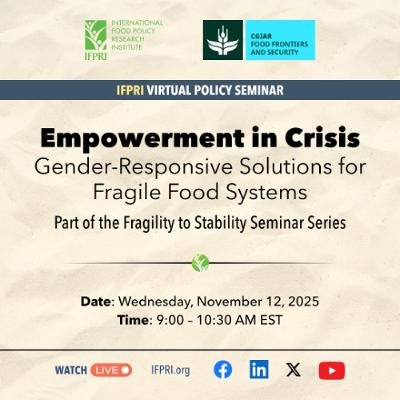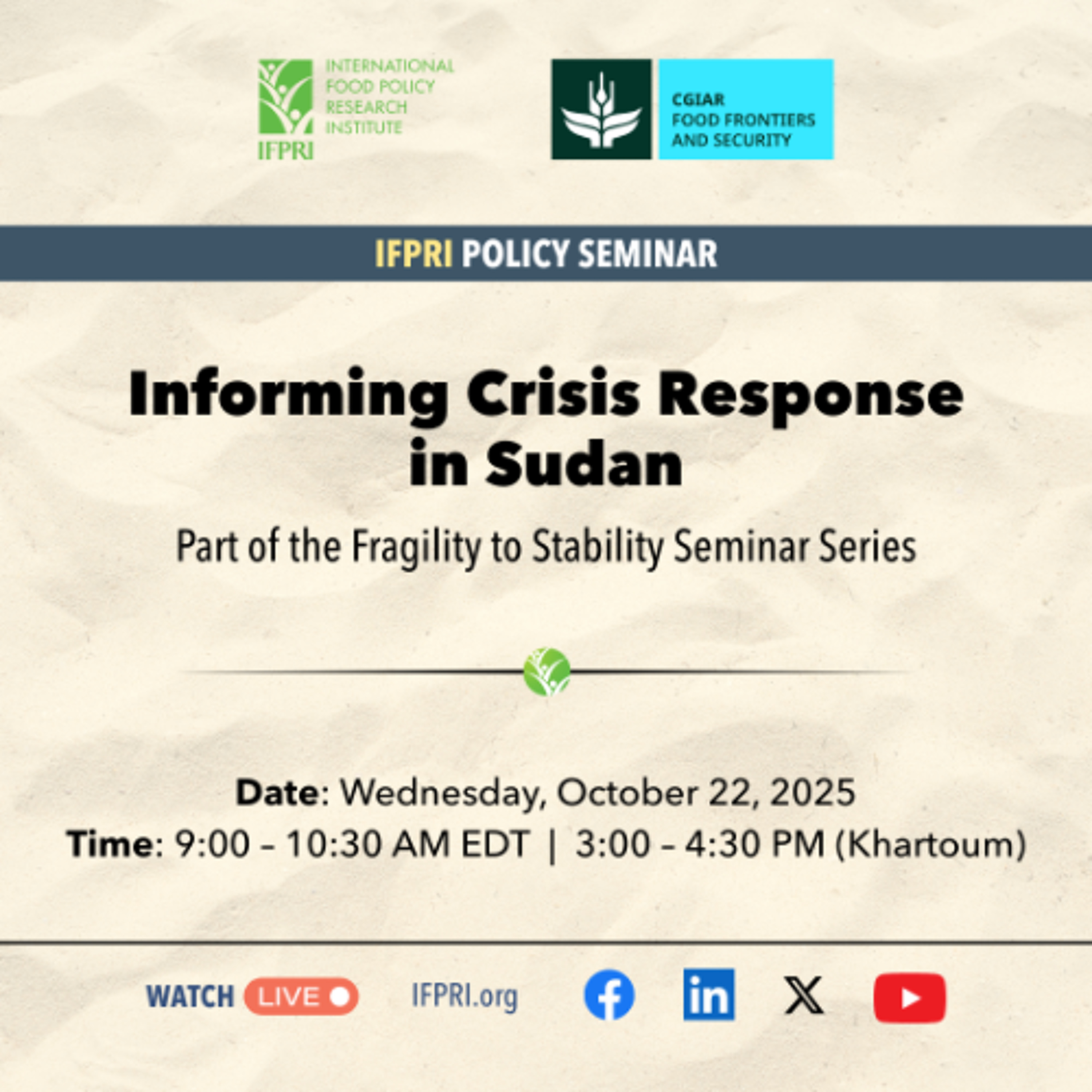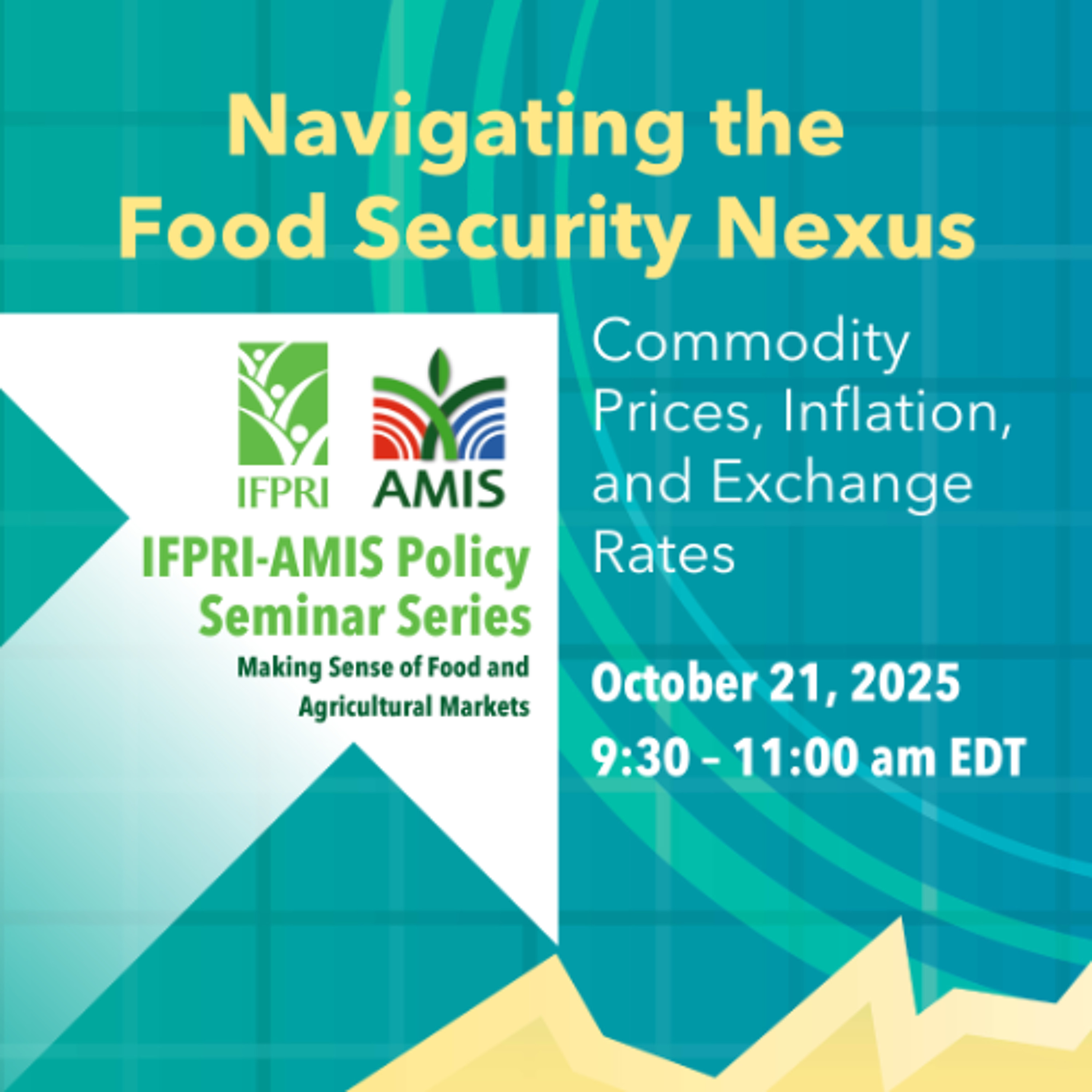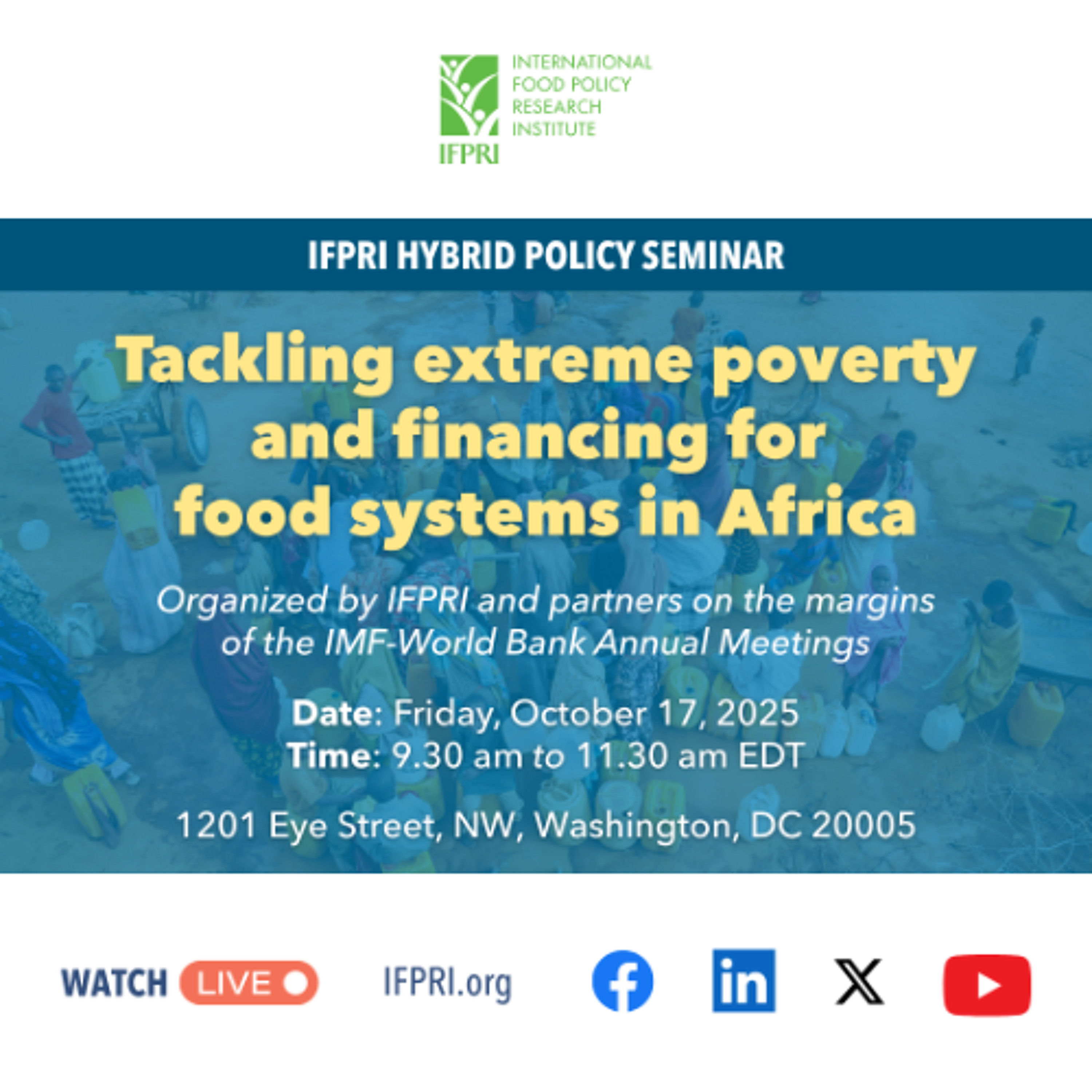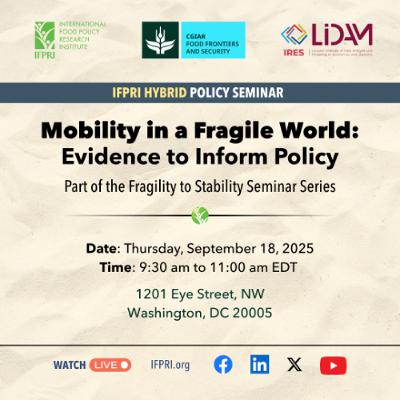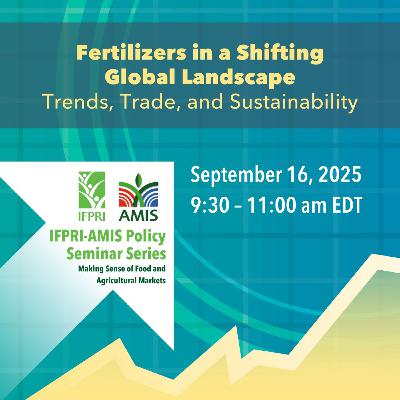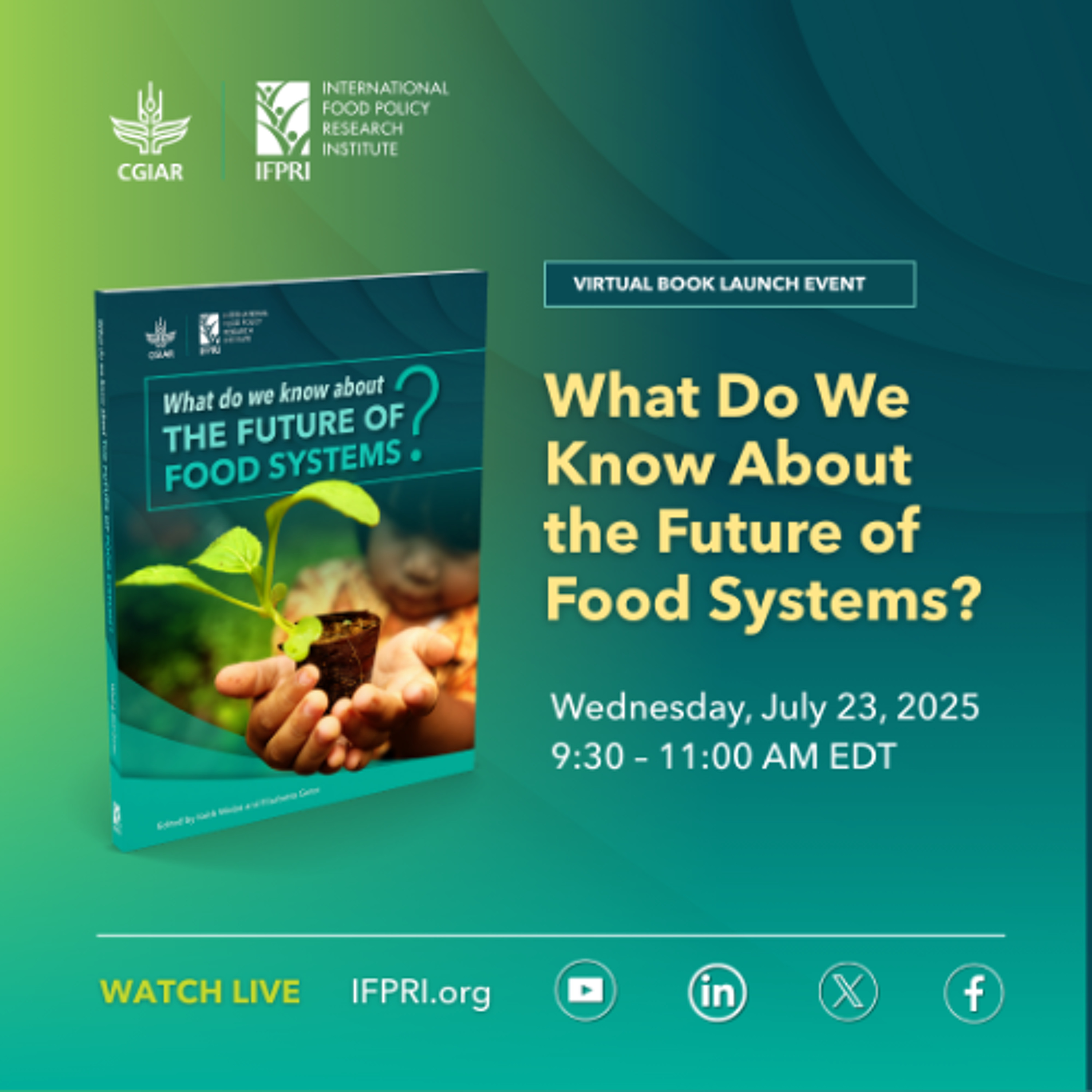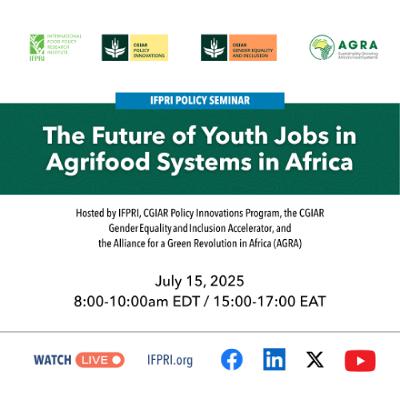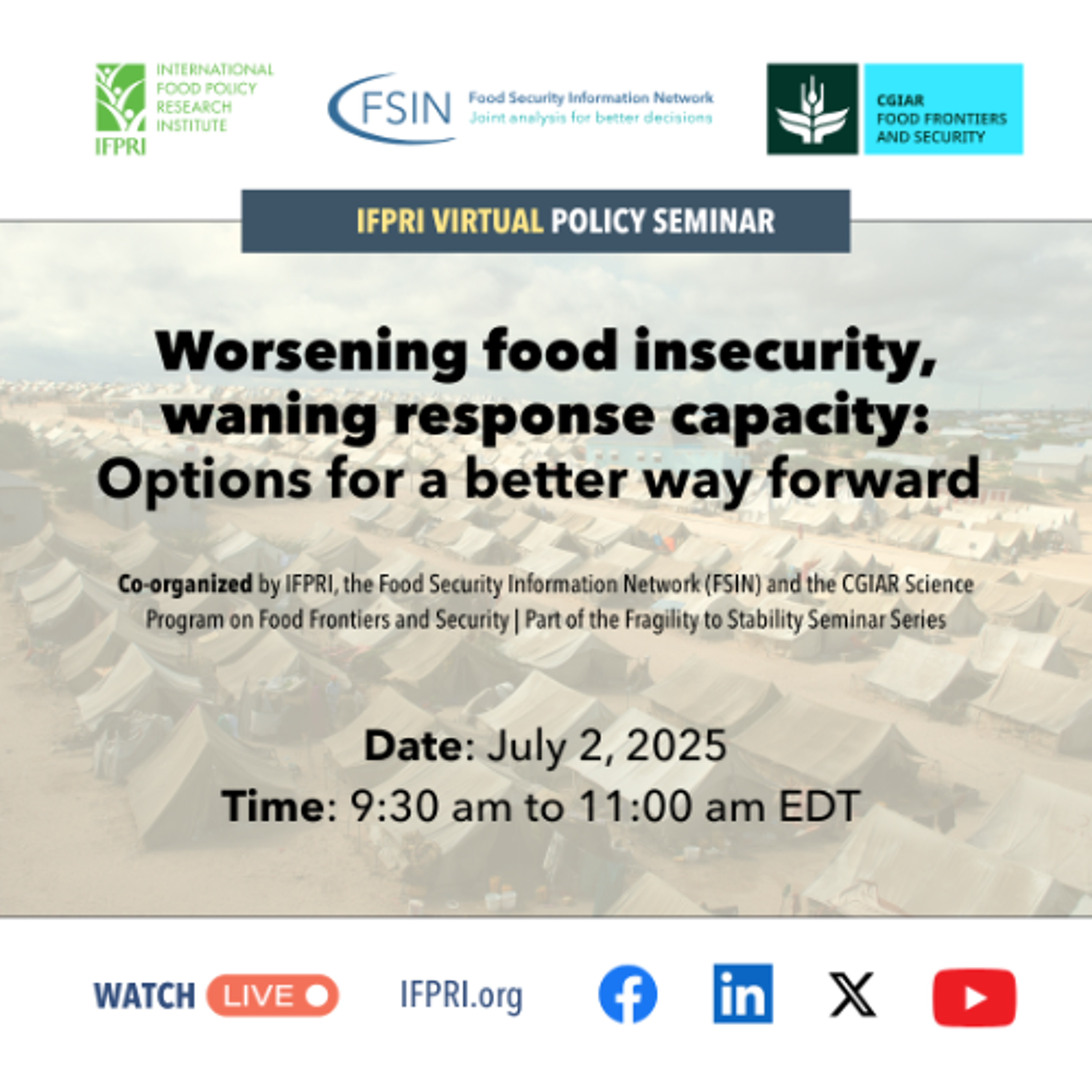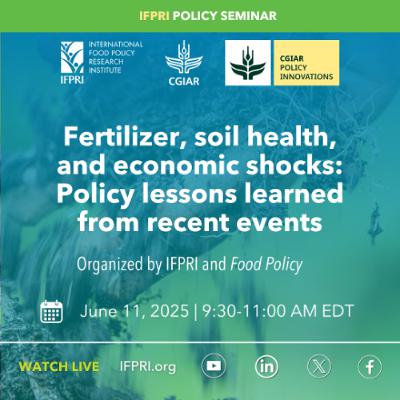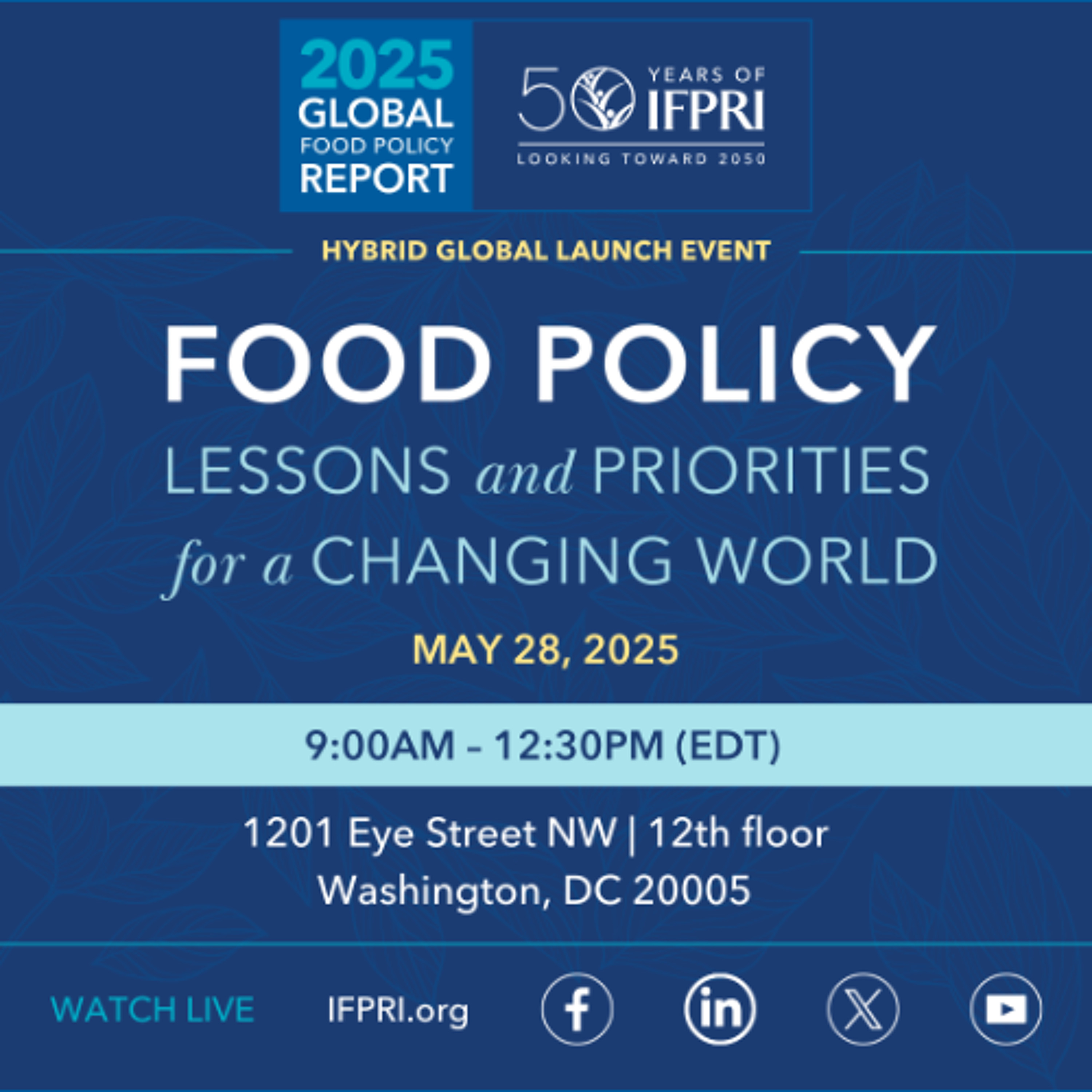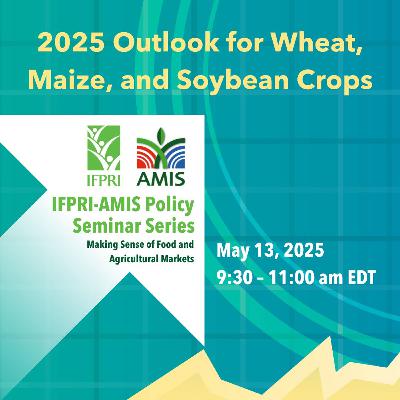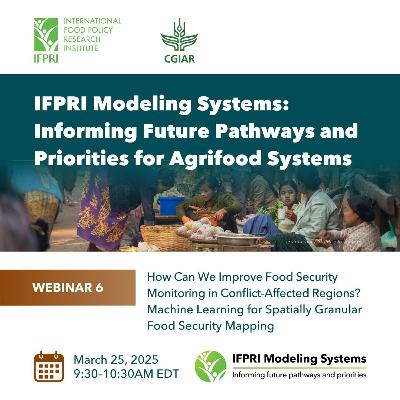Discover IFPRI Podcast
IFPRI Podcast

IFPRI Podcast
Author: International Food Policy Research Institute
Subscribed: 52Played: 1,288Subscribe
Share
© All rights reserved
Description
The International Food Policy Research Institute (IFPRI) provides research-based policy solutions to sustainably reduce poverty and end hunger and malnutrition in developing countries. Established in 1975, IFPRI currently has more than 600 employees working in over 50 countries. It is a research center of CGIAR, a worldwide partnership engaged in agricultural research for development.
544 Episodes
Reverse
Policy Seminar | IFPRI Policy Seminar
Advancing Poverty Graduation in Fragile Contexts: A New Agenda for Research and Policy
Co-organized by IFPRI and Mercy Corps
January 21, 2026
Multifaceted livelihoods interventions that target households in extreme poverty are extremely effective in reducing extreme poverty, with consistent gains in income, consumption, savings, and psychosocial well-being. These interventions, often called graduation models, have been widely evaluated, but most evidence comes from stable rural settings.
In fragile and conflict-affected environments where poverty is increasingly concentrated, household-level interventions may not be sufficient to drive sustained poverty reduction. In today’s climate of constrained funding and compounding crises, there is a pressing need to understand how to adapt, scale, and sustain graduation models to deliver more cost-effective, resilient, and inclusive outcomes in contexts marked by fragility, displacement, and recurrent climate- and conflict-related shocks.
Convened by Mercy Corps and IFPRI, this seminar will present new research, emerging program insights, and opportunities for continued learning to make graduation model interventions more impactful, inclusive, and resilient in fragile settings. The discussion will build on Mercy Corps’ recent report, Closing the Gap: Adapting Poverty Graduation for Fragile Contexts, which highlights evidence-based opportunities to adapt graduation design and delivery.
The seminar will convene leading researchers, donors, policymakers, and implementing partners to showcase emerging evidence from IFPRI, Mercy Corps, and other partners. Together, participants will distill lessons from diverse experiences, explore frontiers for innovation and learning, and chart a forward-looking agenda to strengthen the impact, scalability, and resilience of poverty graduation in fragile contexts—laying the groundwork for deeper collaboration across the research and implementation community.
Introduction and Opening Remarks
Jeeyon Kim, Director of Research, Food Security, Mercy Corps
Highlights from Recent Findings
- The Impact of a Nutrition-Sensitive Graduation Model Program on Child Nutrition: Experimental Evidence from Ethiopia: Kalle Hirvonen, Senior Research Fellow, IFPRI
- Displacement and Development: Evidence from a Graduation Program for Somalia’s Ultra-Poor: Jessica Leight, Senior Research Fellow, IFPRI
- The impact of connecting poverty graduation and market systems development in refugee contexts: evidence from DREAMS Uganda: Daniel Hudner, Senior Researcher, Resilience and Market Systems, Mercy Corps
Panel Discussion
Chaired by: Kibrom Abay, Senior Research Fellow, IFPRI
Radu Ban, Senior Program Officer, Women’s Economic Empowerment, Gates Foundation
Wendy Chamberlin, Senior Technical Advisor, Resilience, Trickle Up
Julie Kedroske, Director, Social Protection Program, Innovations for Poverty Action (IPA)
Kibrom Tafere, Economist, Development Research Group, World Bank
Closing Remarks
Daniel Gilligan, Director, Poverty, Gender, and Inclusion Unit, IFPRI
More about this Event: https://www.ifpri.org/event/advancing-poverty-graduation-in-fragile-contexts-a-new-agenda-for-research-and-policy/
Subscribe IFPRI Insights newsletter and event announcements at www.ifpri.org/content/newsletter-subscription
Policy Seminar | IFPRI Policy Seminar
Reducing Food Loss and Waste: A Food Systems Perspective
Co-organized by IFPRI and the Tata-Cornell Institute for Agriculture and Nutrition, Cornell University
January 13, 2026
Reducing food loss and waste is essential for building more efficient value chains, lowering the climate footprint of agri‑food systems, and improving farmer livelihoods. This seminar brings together new insights and emerging evidence on how to tackle this challenge from multiple angles.
In the first segment, Jocelyn Boiteau and Prabhu Pingali will share key findings from their new book, Wasted Potential: Tackling Food Loss and Waste Across Transforming Food Systems. Their work takes a holistic view of where losses occur from production through consumption, and how smarter policies and investments can meaningfully reduce them. The book importantly also highlights the need for better metrics and approaches to understanding where and why losses occur.
This book launch will be followed by presentations on new IFPRI research on innovative approaches to measuring and reducing food loss and waste in perishable foods. This includes research on the use of artificial intelligence to improve food loss measurement accuracy, reducing spoilage in meat supply chains, and other emerging tools for understanding and addressing losses in highly perishable products.
The seminar will conclude with an open Q&A exploring promising directions for future research and practical, cost‑effective strategies to reduce food loss and waste at scale.
Moderator & Opening Remarks
Alan de Brauw, Senior Research Fellow, IFPRI
Speakers
Prabhu Pingali, Professor, Charles Dyson School of Applied Economics & Management, & Director, Tata-Cornell Institute for Agriculture & Nutrition, Cornell University
Vivian Hoffmann, Senior Research Fellow, IFPRI
Carolyne Maina, Program Director, Technoserve
Assan Ng’ombe, Resilience Officer, Alliance for a Green Revolution in Africa (AGRA)
Closing Remarks
Ruth Hill, Director, Markets, Trade, and Institutions, IFPRI
Download and read the book: https://link.springer.com/book/10.1007/978-3-031-97411-3?
More about this Event: https://www.ifpri.org/event/reducing-food-loss-and-waste-a-food-systems-perspective/
Subscribe IFPRI Insights newsletter and event announcements at www.ifpri.org/content/newsletter-subscription
Special Event
IFPRI Policy Seminar
Shaping Food Policy in a Changing World: Research Priorities for Greater Impact
Organized by IFPRI, with support from the Gates Foundation and the Rockefeller Foundation
December 15, 2025
In today’s fast-changing world and evolving food systems, the need for evidence-based food policy has never been more urgent – demanding research that is timely, inclusive, and tailored to context.
Reliable data and rigorous analysis are essential, but research must also evolve – and become more timely, more relevant, and more inclusive of diverse voices and disciplines. Strengthening how we generate, communicate, and apply evidence is key to ensuring food systems deliver better outcomes for people and the planet.
Join us at IFPRI for a high-level seminar that brings together researchers, policymakers, development partners and leading food system thinkers who have helped deliver science-based impact around the world to explore:
• The role of food policy research in shaping past policies, programs, and investments
• Emerging research questions and challenges in a rapidly shifting global landscape
• How research and outreach must adapt to strengthen pathways from evidence to impact
• How research institutions can adapt to remain responsive in a rapidly changing world
To mark IFPRI’s 50th anniversary, the event will also celebrate the contributions of the Institute’s alumni and launch the Institute’s new research strategy.
00:00:00 - Inaugural Session - https://on.soundcloud.com/hQG0uzZiCahbvJl2nh
01:09:45 - Making an Impact: Successes and Future Approaches - https://soundcloud.com/ifpri/ifpri-special-event-15dec2025?si=6aa560adbae34d58b27556ff6b048009&utm_source=clipboard&utm_medium=text&utm_campaign=social_sharing#t=01%3A09%3A45
02:11:13 - Accelerating Research-to-Impact Pathways - https://on.soundcloud.com/4EYzsVYT2iJsK8ozIf
02:57:44 - IFPRI Alumni Roundtable on Food Policy Research Opportunities and Challenges - https://on.soundcloud.com/ormRkwIbioYaCBBAwV
04:19:22 - Launch of the New IFPRI Strategy - https://on.soundcloud.com/WT0KvQVucGjr81xEV1
05:59:54 - Closing Session - https://on.soundcloud.com/IUw6Lzy3Avpqe3HJRf
More about this Event: https://www.ifpri.org/event/shaping-food-policy-in-a-changing-world-research-priorities-for-greater-impact/
Subscribe IFPRI Insights newsletter and event announcements at www.ifpri.org/content/newsletter-subscription
Policy Seminar | IFPRI Policy Seminar
The Impact of Global Change on Food Security in 2050: Assessing the Risks Through the Lens of Food Trade
Organized by IFPRI in partnership with MIT Abdul Latif Jameel Water and Food Systems Lab/FACT Alliance
November 19, 2025
Trade is crucial to achieving food security. The Jameel Index for Food Trade and Vulnerability (Jameel Index) is a valuable new tool to guide policy and investment decisions that support sustainable international development and food security through food trade.
The Index provides food trade vulnerability scores for more than 180 countries by synthesizing global indicators into a composite vulnerability index to better understand how food trade dynamics can affect food security. It combines a range of meta-indicators to assess food trade vulnerability for nine staple crops and economically important agricultural commodities. The online platform also allows users to customize the Index to reflect their policy or investment questions.
This seminar will present results from the Jameel Index for global change scenario projections to 2050, with inputs from IFPRI’s Food Modeling Framework. IFPRI’s IMPACT-GLOBE modeling linkage and new bespoke bilateral trade model, developed specifically for the Jameel Index, uses a set of population and economic growth, along with climate change scenarios. The seminar will present findings related to food trade, food import vulnerability, and food security, along with insights on drivers of these findings.
Following the presentation of results, a panel of food trade and development experts will discuss policy implications. A general Q&A session will follow the panel.
Presentations of Global Change Results on Food Trade and Security
Kenneth Strzepek, Climate, Water, and Food Specialist MIT Center for Sustainability Science and Strategy J-WAFS
Timothy Thomas, Senior Research Fellow, IFPRI
Faaiqa Hartley, Scientist, IFPRI
Sherwin Gabriel, Scientist, IFPRI
Panel Discussion
Paola De Almieda, Food, Agriculture and Water Portfolio Head – Operating Advisor, Pegasus Capital Advisors
Ruth Hill, Director, Markets, Trade, and Institutions, IFPRI
Mark Rosegrant, Research Fellow Emeritus, IFPRI
Moderator
Greg Sixt, Director, Food and Climate Systems Transformation (FACT) Alliance, Research Manager for Climate and Food Systems, Abdul Latif Jameel Water and Food Systems Lab
More about this Event: https://www.ifpri.org/event/the-impact-of-global-change-on-food-security-in-2050-assessing-the-risks-through-the-lens-of-food-trade/
Subscribe IFPRI Insights newsletter and event announcements at www.ifpri.org/content/newsletter-subscription
Policy Seminar | IFPRI Policy Seminar
Trading the Crosswinds: Macroeconomic Outlook, Trade Policy Uncertainty, and Agricultural Commodity Markets
Co-organized by IFPRI and Agricultural Market Information System (AMIS)
November 18, 2025
Prospects for global grain and oilseed production remain broadly favorable, but the agricultural trade environment continues to face significant uncertainties. Trade policy developments—including the potential for retaliatory measures—are reshaping traditional trade flows and creating challenges for market participants. These shifts are occurring alongside broader macroeconomic factors such as currency movements, rising energy prices, and demand fluctuations, all of which add complexity to global supply chains.
Join us for this seminar featuring the World Bank’s latest Commodity Market Outlook, which will offer insights into the macroeconomic drivers influencing agricultural trade and price dynamics. It will include an update on short-term market fundamentals for wheat, maize, and soybeans, highlighting key developments and potential risks. Industry representatives and traders from various regions will also share how they are responding to uncertainty through risk management strategies, adjustments, and other adaptations to the evolving trade landscape.
Opening Remarks
Monika Tothova, Senior Economist, Food and Agriculture Organization of the United Nations (FAO); Agricultural Market Information System (AMIS) Secretary
Macroeconomic Outlook Shaping Agricultural Trade and Prices
John Baffes, Senior Agriculture Economist, Development Economics Prospects Group, World Bank
Summary of Short-term Developments on Wheat, Maize, and Soybean Markets
Alexander Karavaytsev, Senior Economist, International Grains Council
Panel Discussion
Moderated by Monika Tothova, Senior Economist, Food and Agriculture Organization (FAO); Agricultural Market Information System (AMIS) Secretary and Valeria Piñeiro, Regional Representative for Latin America and the Caribbean (LAC), IFPRI
Scott Gerlt, Chief Economist, American Soybean Association (ASA)
Dmytro Furda, Commercial Director, Tiryaki Agro (Turkiye)
Raphael Blanc Vieira, Commercial Director, Agribrasil
Ole Houe, Chair, Grain Trade Australia
Closing Remarks
Valeria Piñeiro, Regional Representative for Latin America and the Caribbean (LAC), IFPRI
More about this Event: https://www.ifpri.org/event/trading-the-crosswinds-macroeconomic-outlook-trade-policy-uncertainty-and-agricultural-commodity-markets/
Subscribe IFPRI Insights newsletter and event announcements at www.ifpri.org/content/newsletter-subscription
Policy Seminar | IFPRI Policy Seminar
Empowerment in Crisis: Gender-Responsive Solutions for Fragile Food Systems
Co-organized by IFPRI and the CGIAR Science Program on Food Frontiers and Security | Part of the Fragility to Stability Seminar Series
November 12, 2025
Crises—whether driven by conflict, climate shocks, or economic instability—rarely affect everyone equally. Women and girls often bear the heaviest burdens, facing heightened food insecurity, disrupted livelihoods, and increased risks to their health and safety. Yet, women are not only victims of crisis—they are powerful drivers of resilience and recovery. “Empowerment in Crisis: Gender-Responsive Solutions for Fragile Food Systems” brings together researchers, policymakers, and practitioners to examine how gender inequalities are deepened by crises, and how response strategies can be designed to reverse these patterns. The discussion will highlight practical approaches that place women at the center of crisis response and recovery—strengthening their voices, protecting their rights, and harnessing their leadership to build more resilient and equitable food systems.
Introduction and Opening Remarks
Anna Okello, Director, Food Frontiers and Security Science Program, CGIAR
The State of Gender Equality in Fragile Settings
Josephine Appiah-Nyamekye Sanny, Director of Communications, Afrobarometer
Promoting Women’s Empowerment Amid Fragility: Key Findings from Nigeria and Malawi
Vivian Effem-Bassey, Project Manager, ActionAid Nigeria
Jordan Kyle, Research Fellow, IFPRI
Agnes Quisumbing, Senior Research Fellow, IFPRI
Panel Discussion
Aletheia Amalia Donald, Senior Economist, World Bank Africa Gender Innovation Lab
Suzan Gopuk, Senior Technical Advisor – Food Security and Livelihood, GIZ Nigeria
Nkechi Ilochi-Kanny, Director Business Development and Innovation, ActionAid Nigeria
Moderator and Closing Remarks
Katrina Kosec, Senior Research Fellow, IFPRI
More about this Event: https://www.ifpri.org/event/empowerment-in-crisis-gender-responsive-solutions-for-fragile-food-systems/
Subscribe IFPRI Insights newsletter and event announcements at www.ifpri.org/content/newsletter-subscription
Policy Seminar | IFPRI Policy Seminar
Informing Crisis Response in Sudan
Co-organized by IFPRI and the CGIAR Science Program on Food Frontiers and Security | Part of the Fragility to Stability Seminar Series
October 22, 2025
The recent resurgence of armed conflicts in Africa is increasing the need and urgency for investments in shock-responsive humanitarian and social assistance programs. Armed conflicts both increase the need for aid and greatly complicate delivery of humanitarian services to vulnerable populations. In addition, humanitarian organizations are facing an increasing funding gap because of dwindling donor aid.
These challenges are forcing humanitarian organizations to revisit the effectiveness and cost-efficacy of their programs and services for conflict-affected populations. The choice and relative efficacy of alternative modalities and delivery of humanitarian or social assistance programs in these communities remains an active area of debate.
The armed conflict in Sudan, which erupted in April 2023, has created the world’s largest displacement crisis, and has left over 30 million of the 47.5 million Sudanese population needing multifaceted humanitarian assistance. To help inform the crisis response, this policy seminar will bring together researchers, practitioners, and humanitarian organizations working in Sudan to share and discuss recent evidence on preferences and impact of alternative modalities to deliver humanitarian aid amid armed conflict.
Introduction and Opening Remarks
Johan Swinnen, Director General, IFPRI
Laurent Bukera, Country Director and Representative, UN World Food Programme (WFP), Sudan
Highlights From Recent Findings
Khalid Siddig, Senior Research Fellow and Leader of the Sudan Program, IFPRI
Kibrom Abay, Senior Research Fellow, IFPRI
Gabrielle Fox, Chief of Party, Cash Consortium of Sudan (CCS)
Panel Discussion
Alex De Waal, Executive Director, World Peace Foundation, Tufts University
Samantha Chattaraj, Emergency Coordinator, UN World Food Programme (WFP), Sudan
Lena Mahgoub, Convener of the Sudan Social Protection Alliance (SSPA), Former Federal Minister of Labor and Social Development and Co-Founder of Impact Hub Khartoum
Closing Remarks
Katrina Kosec, Senior Research Fellow, IFPRI
Moderator
Hala Abushama, Research Analyst, IFPRI
More about this Event: https://www.ifpri.org/event/informing-crisis-response-in-sudan/
Subscribe IFPRI Insights newsletter and event announcements at www.ifpri.org/content/newsletter-subscription
IFPRI-AMIS Seminar Series | IFPRI Policy Seminar
Navigating the Food Security Nexus: Commodity Prices, Inflation, and Exchange Rates
Co-organized by IFPRI and Agricultural Market Information System (AMIS)
October 21, 2025
Join us for a seminar exploring the complex interplay between global food commodity prices and domestic food price inflation, and the implications for food security. Drawing on recent analytical work and market monitoring, the session will examine how international price movements transmit through domestic markets, often exacerbated by exchange rate fluctuations and macroeconomic volatility.
Fluctuations in exchange rates pose an additional and compounding challenge in how global food commodity prices affect domestic markets. Even when international commodity prices level off, a depreciating currency can still lead to higher local food prices, especially in countries that rely heavily on imports. We will examine why food inflation has disproportionately affected low-income countries—where currency depreciation has amplified the impact of rising global prices, pushing nutritious diets further out of reach for vulnerable populations. The discussion will also highlight how broader macroeconomic conditions, including labor costs and profit margins, have intensified price pressures beyond what commodity shocks alone can explain.
Insights from recent studies will shed light on the speed and asymmetry of price transmission, the role of trade integration, and the implications for food security and nutrition. We will also discuss policy responses and market transparency mechanisms—such as AMIS—that can help mitigate volatility and improve resilience.
Moderator Opening Remarks
Monika Tothova, Senior Economist, Food and Agriculture Organization of the United Nations (FAO); Agricultural Market Information System (AMIS) Secretary
Presentation: Addressing high food price inflation for food security and nutrition
David Laborde, Director, Agrifood Economics and Policy Division, Food and Agriculture Organization of the United Nations (FAO)
Panel Discussion
Moderated by Monika Tothova, Senior Economist, Food and Agriculture Organization (FAO); Agricultural Market Information System (AMIS) Secretary and Joseph Glauber, Research Fellow Emeritus, IFPRI
Helia Costa, Economist, Structural Policy and Research Division of the Economics Department, Organization for Economic Co-operation and Development (OECD)
Fabio Santeramo, Associate Professor, Department of Agricultural Sciences, Food, Resource Economics and Engineering, University of Foggia
Michael Adjemian, Professor, Department of Agricultural and Applied Economics, University of Georgia
Karl Pauw, Senior Research Fellow, IFPRI
Closing Remarks
Joseph Glauber, Research Fellow Emeritus, IFPRI
More about this Event: https://www.ifpri.org/event/navigating-the-food-security-nexus-commodity-prices-inflation-and-exchange-rates/
Subscribe IFPRI Insights newsletter and event announcements at www.ifpri.org/content/newsletter-subscription
Policy Seminar | IFPRI Policy Seminar
Tackling extreme poverty and financing for food systems in Africa
Organized by IFPRI and partners on the margins of the IMF-World Bank Annual Meetings
October 17, 2025
Join speakers from IFPRI, IFAD, UNU-WIDER and the World Bank for a high-level seminar exploring two major African priorities – poverty reduction and food systems transformation in sub-Saharan Africa. Speakers will highlight the need to make progress on reducing poverty in fragile and conflict-affected areas across the continent, and the need to examine how most effectively to finance food systems amidst declining external funding flows.
An inaugural World Bank- UNU-WIDER report on poverty and fragility, being previewed at this seminar, indicates that Sub-Saharan Africa has become the epicenter of the poverty–fragility nexus, with some 70% of people in fragile and conflict affected areas now living in the region and half of the world’s extreme poor projected to reside in fragile SSA states by 2030.
The Africa Report on External Development Financial Flows to Food Systems, recently released by IFAD, AKADEMIYA2063, and IFPRI—analyzes the volume and composition of development finance directed toward African food systems, and implications of decreasing external flows, also for national financing strategies.
This timely discussion will spotlight urgent financing needs and policy pathways to reduce poverty in the most vulnerable regions of Africa and strengthen food systems across the continent. It will also underscore the critical role of robust evidence and data-driven analysis in guiding effective financing strategies and policies —particularly as governments and development partners confront the dual pressures rising fragility and declining external flows. By grounding decisions in rigorous research, stakeholders can better align resources with impact and chart more resilient, equitable paths forward.
Opening Remarks
Luis Felipe López-Calva, Global Director, Poverty Global Department, World Bank Group
Patricia Justino, Director Designate, United Nations University World Institute for Development Economics Research (UNU-WIDER)
Report Presentations
Breaking the Fragility-Poverty Trap (World Bank Group, UNU WIDER)
Maria Eugenia Genoni, Senior Economist, Poverty and Equity Global Practice, World Bank
Africa Report – External Development Financial Flows to Food Systems (IFAD, AK2063 and IFPRI): Key Findings
John Ulimwengu, Senior Research Fellow, IFPRI
High-level Panel
Kamal Gutale, Permanent Secretary for the Office of the Prime Minister of the Federal Government of Somalia
Enilde Sarmento, Macroeconomist-Adviser, International Monetary Fund (IMF); member of Mozambique’s delegation to the annual meetings; former National Director, Directorate of Economic Policies and Development, Ministry of Economy and Finance
Diane Menville, Associate Vice President and Chief Financial Officer, Financial Operations Department, International Fund for Agricultural Development (IFAD)
Ana María Ibáñez, Vice President for Sectors and Knowledge, Inter-American Development Bank (IDB)
Johan Swinnen, Director General, IFPRI
Moderator
Charlotte Hebebrand, Director of Communications & Public Affairs, IFPRI
More about this Event: https://www.ifpri.org/event/tackling-extreme-poverty-and-financing-for-food-systems-in-africa/
Subscribe IFPRI Insights newsletter and event announcements at www.ifpri.org/content/newsletter-subscription
CGIAR Seminar Series | Series/Special Event
The EU Deforestation Regulation: Policy Implications and Research Frontiers
Co-organized by IFPRI, CGIAR, and Germany’s Federal Ministry for Economic Cooperation and Development (BMZ)
October 14, 2025
In June 2023, the European Union (EU) adopted its Regulation on Deforestation-Free Products (EUDR)—a landmark policy designed to reduce global deforestation and forest degradation driven by EU consumption. Under the regulation, key commodities with the biggest impacts on deforestation—soy, cattle, palm oil, cocoa, coffee, wood, and natural rubber—cannot be placed on the EU market or exported unless they are free of deforestation and legally produced.
The EUDR was scheduled for entry into force in December 2025 and in June 2026 for small and micro enterprises, but a one-year delay was proposed by the European Commission on 23 September, due to capacity concerns with the IT system set up for due diligence reporting by businesses.
Join us for this virtual event convening policymakers, development practitioners, researchers, and industry representatives to examine how the EUDR is likely to reshape trade dynamics, sustainability standards, and development priorities across the globe.
As countries and companies prepare for EUDR implementation, this seminar will examine how they can seize upon opportunities and mitigate risks associated with it. Leading voices from government, research, industry, and civil society will discuss how to ensure equitable and inclusive production aligned with EUDR requirements across diverse production systems, and how to address knowledge and technology gaps to support data-driven, smallholder-friendly solutions.
Moderator Welcome Remarks
Charlotte Hebebrand, Director of Communications & Public Affairs, IFPRI
Session 1
Rationale and Scope of the EUDR: Lisa Kirfel-Rühle, Deputy Head of Division 122 Agriculture, Rural Development, Federal Ministry for Economic Cooperation and Development (BMZ)
Global Deforestation Trends & Outlook, and Key Considerations Arising from EUDR Implementation: Beria Leimona, Theme Leader, Climate Change, Energy and Low-Carbon Development, The Center for International Forestry Research and World Agroforestry (CIFOR-ICRAF)
International Cooperation Framework: Simon Gmeiner, Policy Officer, European Commission
Session 2
Engaging on the EUDR: H.E. Andri Hadi, Ambassador of the Republic of Indonesia to the Kingdom of Belgium, Grand Duchy of Luxembourg, and the European Union
Malaysian Sustainable Palm Oil Certification: Mohd Hasbollah Suparyono, Chief Operating Officer, Malaysian Sustainable Palm Oil (MSPO)
Considerations for Mercosur Countries: Valeria Piñeiro, Regional Representative for Latin America and the Caribbean (LAC), IFPRI
China’s Efforts to Source Zero Deforestation Soybeans from Brazil: Kevin Chen, Senior Research Fellow, IFPRI
Session 3
Inclusive Pathways for Smallholders in Deforestation-Free Supply Chains: Izzana Salleh, Secretary General, Council of Palm Oil Producing Countries (CPOPC)
EUDR implications for coffee and cocoa smallholders in Africa: Vanessa Adams, Founder and Chief Executive Officer, Level4International
Identification of Production Origin and Public Verification for Deforestation – Free Agricultural Supply Chains in Colombia: Sandra Durango, Postdoctoral Fellow, Alliance Bioversity and CIAT
More about this Event: https://www.ifpri.org/event/the-eu-deforestation-regulation-policy-implications-and-research-frontiers/
Subscribe IFPRI Insights newsletter and event announcements at www.ifpri.org/content/newsletter-subscription
Policy Seminar | IFPRI Policy Seminar
Mobility in a Fragile World: Evidence to Inform Policy
Co-organized by IFPRI, the CGIAR Science Program on Food Frontiers and Security, and the Louvain Institute of Data Analysis and Modeling in Economics and Statistics (LIDAM), IRES | Part of the Fragility to Stability Seminar Series
September 18, 2025
Migration today reflects a complex interplay of demographic pressures, conflict, poverty, climate change, and economic shocks. Worldwide, one in every seven people is a migrant—that is, someone who changes his or her country of usual residence, irrespective of the reason for migration—or a refugee forced to leave his or her home, often without warning, for reasons including war, violence, or persecution. Over the past two decades, international migration and forced displacement have surged, with more than 100 million additional people on the move—a large share of whom originate from rural areas, driven by a lack of economic opportunities, environmental degradation, and insecurity.
The number of refugees has doubled since the early 2000s, with most hosted by low- and middle-income countries. Ongoing conflicts and intensifying climate crises have compounded vulnerabilities, leaving 80% of displaced people facing acute food insecurity. Climate change-related displacement disproportionately affects women, who are also at heightened risk of violence and exploitation during migration journeys and in host communities.
This policy seminar will explore these complex dynamics and assess how economic analysis, machine learning, and policy innovation can contribute to more inclusive, equitable, and effective responses to migration and forced displacement.
Moderator Welcome Remarks
Katrina Kosec, Interim Deputy Director, CGIAR Science Program on Food Frontiers and Security; Senior Research Fellow, IFPRI
Opening Remarks
Ruth Hill, Director, Markets, Trade, and Institutions, IFPRI
Setting the Stage: The Migration Challenge
Anna Maria Mayda, Professor of Economics, School of Foreign Service and Department of Economics, and Incoming Director, Institute for the Study of International Migration (ISIM), Georgetown University (GU)
Research in Action: This three-part session will showcase how current research is shaping better migration policies
Silvia Peracchi, Postdoctoral Fellow, Institute of Economics and Social Research (IRES), Louvain Institute of Data Analysis and Modeling in Economics and Statistics (LIDAM), UCLouvain
Francisco Ceballos, Research Fellow, IFPRI
Thomas Ginn, Research Fellow, Center for Global Development
Building the Evidence Base for Smarter Policy in Fragile and Conflict-Affected Contexts: What Are the Gaps and Needs
Panelists
Andrew Harper, Special Advisor on Climate Action, the United Nations High Commissioner for Refugees (UNHCR)
Damien Jusselme, Head, Data Science and Analytics (Foresight), International Organization for Migration (IOM)
Jean-Francois Maystadt, Professor, Fonds de la Recherche Scientifique (FNRS), Louvain Institute of Data Analysis and Modeling in Economics and Statistics (LIDAM) / Institut de Recherches Économiques et Sociales (IRES), Université catholique de Louvain, and Lancaster University Management School
Closing Remarks
Kate Ambler, Senior Research Fellow, IFPRI
More about this Event: https://www.ifpri.org/event/mobility-in-a-fragile-world-evidence-to-inform-policy/
Subscribe IFPRI Insights newsletter and event announcements at www.ifpri.org/content/newsletter-subscription
IFPRI-AMIS Seminar Series | IFPRI Policy Seminar
Fertilizers in a Shifting Global Landscape – Trends, Trade, and Sustainability
Co-organized by IFPRI and Agricultural Market Information System (AMIS)
September 16, 2025
Fertilizers—both mineral and organic—are indispensable inputs in modern agriculture. Yet, recent years have seen unprecedented volatility in fertilizer prices, trade flows, and policy responses, reshaping the landscape for producers, traders, and farmers alike. This event will explore the evolving dynamics of the global fertilizer market and its critical role in food security and agricultural sustainability.
Drawing on the latest research and market intelligence from AMIS, FAO’s Food Outlook and IFPRI, this session will unpack the key drivers behind recent market disruptions and recovery patterns, including the environmental footprint of fertilizer use, and a variety of policy developments affecting market access and affordability.
Opening Remarks
Monika Tothova, Senior Economist, Food and Agriculture Organization (FAO); Agricultural Market Information System (AMIS) Secretary
Charlotte Hebebrand, Director of Communications and Public Affairs, IFPRI
Presentations
Current Situation on the Fertilizer Markets: Delphine Leconte-Demarsy, Fertilizer consultant, Agricultural Market Information System (AMIS)
US Tariffs and Fertilizer Trade: Shawn Arita, Associate Director and Associate Research Professor, Agricultural Risk Policy Center, North Dakota State University (NDSU)
Policy Reforms and Fertilizer Use: Fertilizer Subsidies and Alternatives: Ruth Hill, Director, Markets, Trade, and Institutions, IFPRI
Discussion
Moderated by Monika Tothova, Senior Economist, Food and Agriculture Organization (FAO); Agricultural Market Information System (AMIS) Secretary and Charlotte Hebebrand, Director of Communications and Public Affairs, IFPRI
Maria Antip, Fertilizer consultant, Food and Agriculture Organization (FAO)
Veronica Nigh, Senior Economist, The Fertilizer Institute
Links:
More about this Event: https://www.ifpri.org/event/fertilizers-in-a-shifting-global-landscape-trends-trade-and-sustainability/
Subscribe IFPRI Insights newsletter and event announcements at www.ifpri.org/content/newsletter-subscription
Book Launch | IFPRI Policy Seminar
What Do We Know About the Future of Food Systems?
Co-organized by IFPRI and the CGIAR
This event is also part of the Policy Innovations Global Webinar Series of the CGIAR Science Program on Policy Innovations
July 23, 2025
Food systems have achieved remarkable progress in recent decades, but moving forward, they will face significant challenges in delivering the many outputs and services—such as poverty alleviation, nutrition and health, livelihoods, and environmental sustainability—we expect and need. By combining sophisticated analysis and close engagement with stakeholders, we can identify and explore the likely impacts of different future scenarios based on alternative development pathways and external factors. These results can help inform the decisions we make about food systems today.
This event marks the launch of What Do We Know About the Future of Food Systems?, a collection of short chapters that synthesize current knowledge about different aspects of the future of food systems. Written by more than 100 scientists from around the world with expertise in a wide range of related disciplines and regions, these chapters provide accessible overviews of the latest foresight research on each topic, guide readers toward more detailed information, and offer insights into how our knowledge of future trends can be improved.
The launch will present an overview of the book and highlight key findings from select chapters, followed by a panel discussion featuring speakers from country partners, regional organizations, and donor agencies.
Moderator Welcome
Elisabetta Gotor, Principal Scientist, Performance, Innovation and Strategic Analysis, Alliance of Bioversity International and CIAT
Opening Remarks
Sandra Cristina Kothe Milach, Chief Scientist, CGIAR
Overview
Keith Wiebe, Senior Research Fellow, IFPRI
Selected Chapter Highlights
Impact area: Poverty – Karl Pauw, Senior Research Fellow, IFPRI
Driver: Innovation – Daniel Mason-D’Croz, Senior Research Associate, Department of Global Development, Cornell University
Region: West and Central Africa – Dolapo Enahoro, Senior Agricultural Economist, International Livestock Research Institute (ILRI)
Commodity: Aquatic Foods – Chin Yee Chan, Scientist, WorldFish
Panel Discussion
Vanessa da Fonseca Pereira, Advisor at the Ministry of Agriculture and Livestock (MAPA) and analyst at Embrapa
Kindie Tesfaye Fantaye, Head, Climate Adaptation and Resilience, Alliance for a Green Revolution in Africa (AGRA)
Ruben Echeverria, Senior Advisor Agriculture Development, Gates Foundation
Closing Remarks
Clemens Breisinger, Program Leader for the Kenya Strategy Support Program; Senior Research Fellow, IFPRI
Elisabetta Gotor, Principal Scientist, Performance, Innovation and Strategic Analysis, Alliance of Bioversity International and CIAT
Links:
More about this Event: https://www.ifpri.org/event/what-do-we-know-about-the-future-of-food-systems/
Subscribe IFPRI Insights newsletter and event announcements at www.ifpri.org/content/newsletter-subscription
IFPRI Policy Seminar
The Future of Youth Jobs in Agrifood Systems in Africa
Hosted by IFPRI, the CGIAR Policy Innovations Program, the CGIAR Gender Equality and Inclusion Accelerator, and the Alliance for a Green Revolution in Africa (AGRA)
July 15, 2025
Africa’s population is the youngest of any region, affording the continent an adequate workforce to drive economic and social transformation. However, African economies are finding it difficult to create employment opportunities for this “youth bulge”—opportunities that are needed to advance on SDG target 8.6 to substantially reduce the proportion of youth not in employment, education or training (NEET). As of 2020, more than 20 percent of young men and women in Africa fell into this category. African youth wield growing political and social power as they vent their frustrations about the lack of opportunities. Although youth-led protests and their underlying causes are not new in Africa, the recent movements represent an important moment for the region’s youth.
The agrifood system in Africa remains the backbone of national economies and provides more than half of jobs in most African countries. Thus, it still holds substantial potential to absorb or catalyze youth engagement in productive activities in Africa. But this change will not happen by itself. It will require sustained efforts in policy research and development. While much of the literature and debate on the employment crisis have focused on the role of agriculture in absorbing Africa’s youth, the scope of debate and research should be expanded to include the role of youth across the entire food system.
Introduction and Opening Remarks
Sandra Cristina Kothe Milach, Chief Scientist, CGIAR
Alice Ruhweza, President, Alliance for a Green Revolution in Africa (AGRA)
Steven Were Omamo, Director for Africa, and Director for Development Strategies and Governance, IFPRI
Jobs in Agrifood System in Africa
Luc Christiaensen, Lead Agricultural Economist, Eastern and Southern Africa, World Bank
Landscape of youth engagement in agrifood system in selected African countries
Kibrom Abay, Senior Research Fellow, IFPRI
Youth aspirations and constraints in Nigeria/Rwanda
Jessica Heckert, Senior Research Fellow, IFPRI
Initiatives to support young women: learnings from AGRA
Catherine Rusagara, Head, Youth Entrepreneurship for the Future of Food and Agriculture, Alliance for a Green Revolution in Africa (AGRA)
Panel Discussion: How can Africa create more jobs for the youth: Cases and success stories from youth-led initiatives and experiences?
Moderated by Nana Amoah, Director – Gender, Youth and Inclusiveness, Alliance for a Green Revolution in Africa (AGRA)
Innocent Ogirinye Adoga, Youth Initiative for Sustainable Agriculture (YISA), Nigeria
Mashoko Chakanyuka, Head of Youth Employment in Agriculture, Alliance for a Green Revolution in Africa (AGRA)
Kisanet Haile Molla, Spatial Engineer, Civil Engineer, Youth Representative for Infrastructure, World Bank
Elizabeth Mwende, Agricultural Engineer, and Youth Representative, the UN Food Systems Coordination Hub
Esther Kimani, CEO and founder, Farmer Lifeline Technologies
Janette C. Toroitich, Agripreneur, Kenya
Closing Remarks
Clemens Breisinger, Senior Research Fellow, IFPRI; Interim Director, Policy Innovations, CGIAR
Nicoline de Haan, Interim Director, CGIAR Gender Equality & Inclusion (GEI) Accelerator
Boaz Blackie Keizire, Director for Policy and State Capability, Alliance for a Green Revolution in Africa (AGRA)
Moderator
Christine Mwangi, Research Officer, IFPRI
Links
More about this Event: https://www.ifpri.org/event/the-future-of-youth-jobs-in-agrifood-systems-in-africa/
Subscribe IFPRI Insights newsletter and event announcements at www.ifpri.org/content/newsletter-subscription
Policy Seminar | IFPRI Policy Seminar
Worsening food insecurity, waning response capacity: Options for a better way forward
Co-organized by IFPRI, the Food Security Information Network (FSIN) and the CGIAR Science Program on Food Frontiers and Security | Part of the Fragility to Stability Seminar Series
July 2, 2025
Food crises arise from the complex interplay of conflict, poverty, climate variability, and economic shocks, resulting in acute food insecurity among vulnerable populations. According to the latest Global Report on Food Crises (2025), the number of people facing severe levels of acute food insecurity has tripled over the past decade, rising from around 100 million in 2016 to nearly 300 million people in 2024.
The report warns that intensifying conflict in areas prone to food crises could worsen these conditions, policy uncertainty in major economies could slow income growth around the world, and budget cuts could erode humanitarian assistance, as well as capacities to monitor and anticipate drivers of acute food insecurity.
This seminar will assess these prospects and discuss ways to counteract them.
Speakers will discuss:
• Trends in acute food insecurity and major drivers
• Challenges posed by budget cuts by major aid donors and impacts on food crisis response capacities
• Obstacles faced by early warning, early action systems in collecting adequate data to monitor and anticipate food crises and address drivers
• Insights from AI-driven predictive modeling approaches to overcome select data challenges and better inform anticipatory and preventive action
Opening Remarks
Johan Swinnen, Director General, IFPRI
Global food crises, fragility, and prospects: Trends and drivers
Presentation of the key findings of the 2025 Global Report on Food Crises
Sara McHattie, Global Coordinator, Food Security Information Network (FSIN)
What are the consequences for food insecurity risks of waning international humanitarian and development assistance? EC perspectives and responses
Simona Bortolotti, Policy Officer, Sustainable Agrifood Systems and Fisheries Unit, Directorate General for International Partnerships, European Union
Implications of foreign aid cuts for climate resilience and food insecurity
Kalle Hirvonen, Research Fellow, UNU-WIDER and Senior Research Fellow, IFPRI
Challenges to humanitarian assistance and anticipatory action amid Sudan’s worsening food crisis
Nigist Abebe, Regional Representative, Chemonics International; Vulnerability Analysis and Mapping National Officer, World Food Programme (WFP) Sudan
A new approach to assess food insecurity trends and drivers to better inform early action systems
Luca Russo, Independent consultant and co-lead of study on trends and drivers of acute food insecurity commissioned by the Global Network Against Food Crises (GNAFC)
Using AI-informed modeling to overcome challenges to data collection and predict food crises
Yanyan Liu, Senior Research Fellow, IFPRI
Concluding Remarks
Rob Vos, Senior Research Fellow, IFPRI
Moderator
Katrina Kosec, Interim Deputy Director, CGIAR Science Program on Food Frontiers and Security; Senior Research Fellow, IFPRI
Links:
More about this Event: https://www.ifpri.org/event/worsening-food-insecurity-waning-response-capacity-options-for-a-better-way-forward/
Subscribe IFPRI Insights newsletter and event announcements at www.ifpri.org/content/newsletter-subscription
IFPRI Policy Seminar
Fertilizer, soil health, and economic shocks: Policy lessons learned from recent events
Organized by IFPRI, Food Policy, and the CGIAR Science Program on Policy Innovations
June 11, 2025
Join us for a discussion of key findings from a recent special issue of Food Policy exploring the complex interactions between fertilizer use, soil health management, and economic shocks in various agricultural systems. Governments around the world have long implemented policies to enhance agricultural productivity through inorganic fertilizer application and soil management, yet recent global disruptions, from the 2020–2022 food, fuel, and fertilizer price crisis to ongoing climatic uncertainties, have challenged the effectiveness of these interventions.
Authors and editors of the special issue will present evidence on the medium-term effects of rising fertilizer prices and their implications for global demand, highlighting the disproportionate effects on smallholder farmers in low- and middle-income countries. The discussion will also cover issues related to the role of targeted subsidy programs, integrated soil fertility management, and site-specific nutrient approaches.
A panel of fertilizer experts will discuss how these insights can support policymakers seeking to mitigate price volatility, strengthen soil health, and ensure resilience in agricultural production, particularly during adverse weather events and economic shocks. This seminar offers critical perspectives for researchers, policymakers, and agribusiness leaders working to build more sustainable and equitable food systems in an increasingly uncertain world.
Introduction and Opening Remarks
Ruth Hill, Director, Markets, Trade, and Institutions, IFPRI
Christopher Barrett, Stephen B. and Janice G. Ashley Professor of Applied Economics and Management, Charles H. Dyson School of Applied Economics and Management, Cornell University, Ithaca, NY
A synthesis of recent evidence on the policy dimensions of fertilizer, soil health, and economic shocks
Kibrom Abay, Senior Research Fellow, IFPRI
Country and cross-country policy experience: A conversation with the authors
Moderated by David J. Spielman, Director, Innovation Policy and Scaling, IFPRI
Akuffo Amankwah, Senior Economist, World Bank
Catherine Ragasa, Senior Research Fellow, IFPRI
Jaweriah Hazrana, Postdoctoral Research Fellow, Arizona State University
Pauline Chivenge, Senior Scientist, International Rice Research Institute (IRRI)
Panel Discussion: How do we build resilience to future shocks in international and domestic fertilizer markets?
Moderated by Charlotte Hebebrand, Director, Communications and Public Affairs, IFPRI
Peter Odhiambo Owoko, Head, Policy Coordination, Directorate of Agricultural Policy Research and Regulations, State Department for Crop Development & Agricultural Research, Kenya
Latha Nagarajan, Director, Sustainable Opportunities for Improving Livelihoods with Soils (SOILS) Consortium, International Fertilizer Development Center (IFDC)
Shamie Zingore, Director of Research and Development, African Plant Nutrition Institute (APNI)
Avinash Kishore, Senior Research Fellow, IFPRI
Closing Remarks
Ruth Hill, Director, Markets, Trade, and Institutions, IFPRI
Links:
More about this Event: https://www.ifpri.org/event/fertilizer-soil-health-and-economic-shocks-policy-lessons-learned-from-recent-events/
Subscribe IFPRI Insights newsletter and event announcements at www.ifpri.org/content/newsletter-subscription
Global Food Policy Report
IFPRI Policy Seminar
2025 Global Food Policy Report | Food Policy: Lessons and Priorities for a Changing World
May 28, 2025
Over the last 50 years, the world’s food systems have evolved tremendously amid major economic, environmental, and social changes. Throughout this period, policy research has played a critical role in providing evidence and analysis to inform decision-making that supports agricultural growth, better livelihoods, and improved food security, nutrition, and well-being for all.
IFPRI’s 2025 Global Food Policy Report—a special edition marking the Institute’s 50th anniversary. This year’s flagship report examines the evolution and impact of food policy research and assesses how it can better equip policymakers to meet future challenges and opportunities.
Despite meaningful progress over the last half-century, conflict, climate change, rising inequality, and geopolitical tensions remain major challenges to reducing poverty, hunger, and malnutrition. As we approach 2050, policy research and analysis will be essential to help build sustainable healthy food systems in this changing world.
Thematic presentations from IFPRI’s leading researchers will explore the role of evidence in shaping policies over the past 50 years, as well as the potential for research to address emerging challenges and opportunities.
A keynote lecture by Michael Kremer, Chair of the Innovation Commission and joint winner of the 2019 Economics Nobel Prize, will address innovations for the future. Following these remarks, a distinguished panel of experts will discuss priorities for policy research in the decades to come.
Welcome Remarks
Ismahane Elouafi, Executive Managing Director, CGIAR
Unveiling of IFPRI’s flagship Global Food Policy Report
Johan Swinnen, Director General, IFPRI
Christopher B. Barrett, Stephen B. and Janice G. Ashley Professor of Applied Economics and Management, Cornell University
Thematic GFPR presentations
James Thurlow, Director, Foresight and Policy Modeling (FPM) Unit, IFPRI
Ruth Hill, Director of Markets, Trade and Institutions (MTI) Unit, IFPRI
Steven Were Omamo, Director, Development Strategies and Governance (DSG) Unit and Director for Africa, IFPRI
Shalini Roy, Senior Research Fellow, Poverty, Gender, and Inclusion (PGI) Unit, IFPRI and Agnes Quisumbing, Senior Research Fellow, Poverty, Gender, and Inclusion (PGI) Unit, IFPRI
Stuart Gillespie, Nonresident Senior Fellow, IFPRI and Deanna Olney, Director, Nutrition, Diets, and Health (NDH), IFPRI
David Spielman, Director, Innovation Policy and Scaling (IPS) Unit, IFPRI
Keynote Address and Strategy Discussion: A Focus on Innovations for the Future
Michael Kremer, Professor in Economics; Director of Development Innovation Lab; and Faculty Director, Development Economics Center, University of Chicago; and 2019 Nobel Laureate in Economic Sciences
Forward Looking Panel Discussion on Food Policy Research Priorities
Moderator: Purnima Menon, Senior Director, Food and Nutrition Policy; Acting Senior Director, Transformation Strategy, IFPRI
Alice Ruhweza, President, Alliance for a Green Revolution in Africa (AGRA)
Ramesh Chand, Member, National Institution for Transforming India (NITI Aayog)
Joan Matji, Global Director, Child Nutrition and Development, United Nations Children’s Fund (UNICEF)
Ruben Echeverria, Senior Advisor, Agriculture Development, Gates Foundation
Santiago Alba-Corral, Vice-President, Programs and Partnerships, International Development Research Centre (IDRC), Canada
Marianne Grosclaude, Practice Manager, Agriculture and Food Global Practice, World Bank
Moderator
Charlotte Hebebrand, Director of Communications and Public Affairs, IFPRI
Links:
More about this Event: https://www.ifpri.org/event/2025-global-food-policy-report-food-policy-research-for-a-brighter-future-looking-towards-2050/
Subscribe IFPRI Insights newsletter and event announcements at www.ifpri.org/content/newsletter-subscription
IFPRI-AMIS Seminar Series | IFPRI Policy Seminar
2025 Outlook for Wheat, Maize, and Soybean Crops
Co-organized by IFPRI and Agricultural Market Information System (AMIS)
May 13, 2025
Global grain and oilseed markets are facing great uncertainty as producers in the northern hemisphere complete their spring plantings. While some dryness has affected winter crop regions in both North America and Europe, sowing conditions remain favorable. Market participants are closely observing rapid policy developments related to tariffs and possible retaliatory measures. The changing trade landscape will also affect the overall macroeconomic environment, with impacts expected on energy prices, exchange rates, and growth prospects, and further implications for agricultural production and trade.
Opening Remarks
Joseph Glauber, Research Fellow Emeritus, IFPRI
Presentations
Overview of macroeconomic prospects: John Baffes, Senior Agriculture Economist, Development Economics, World Bank
Overview of crop conditions: Brian Barker, Principal Faculty Specialist, University of Maryland; GEOGLAM Crop Monitor for AMIS lead, and Global Crop Monitor lead
Overview of wheat, maize and soybeans: Seth Meyer, Chief Economist, United States Department of Agriculture (USDA)
Discussion
Moderated by Monika Tothova, Senior Economist, Food and Agriculture Organization (FAO); Agricultural Market Information System (AMIS) Secretary
Di Yang, Economist, Food and Agriculture Organization of the United Nations (FAO)
Erin Collier, Economist, Food and Agriculture Organization of the United Nations (FAO)
Nathan Kemp, Senior Economist, International Grains Council (IGC)
Moderator
Monika Tothova, Senior Economist, Food and Agriculture Organization (FAO); Agricultural Market Information System (AMIS) Secretary
Links:
More about this Event: https://www.ifpri.org/event/2025-outlook-for-wheat-maize-and-soybean-crops/
Subscribe IFPRI Insights newsletter and event announcements at www.ifpri.org/content/newsletter-subscription
IFPRI Policy Seminar
Ending Hunger and Malnutrition: Keeping Our Eyes on the Road
Organized by IFPRI in collaboration with the World Bank
IFPRI Seminar during World Bank/International Monetary Fund (IMF) Spring Meetings
April 22, 2025
While global agricultural commodity prices have come down from the high levels seen in recent years, the world remains far off track in meeting the SDG2 of ending hunger and malnutrition by 2030. Last year, close to 300 million people faced food crisis while the number of people on the cusp of famine doubled. Efforts to address hunger and malnutrition are facing considerable hurdles, including protracted as well as new conflicts, cuts in official development assistance, inefficiencies in the global financing architecture, an increasingly fragmented political landscape and multipolarizing international order. How can the world mobilize more public and private resources to tackle the current food crisis, create more robust value chain and trade channels, and set countries on a path towards peace, stability and economic growth?
Timed to align with the WB-IMF Spring Meetings, this event will convene policymakers, representatives of international organizations, private sector and food system experts for a stocktaking of where we find ourselves and to chart solutions towards more aligned domestic and international, public and private financing flows aimed at ending hunger and malnutrition. Picking up on the Spring Meetings’ core theme of jobs as a path to prosperity, the important role of jobs in food value chains and improved livelihoods for furthering food security and nutrition will also be explored.
This policy seminar will:
Take stock of recent data, trends and outlooks for food and nutrition security, with a focus on the most vulnerable countries.
Discuss challenges and opportunities in resourcing, regional and global cooperation, and innovation to bend the curve of hunger and malnutrition.
Examine research findings and share policy recommendations to prevent and prepare for food crises, while broadening the focus to strengthening value chains and markets in developing countries.
Opening Session
Moderator: Ruth Hill, Director, Markets, Trade, and Institutions, IFPRI
Speakers
Shobha Shetty, Global Director, Agriculture and Food, World Bank
Johan Swinnen, Director General, IFPRI
Maximo Torero, Chief Economist, Food and Agriculture Organization of the United Nations (FAO)
High-level Panel on Challenges and Opportunities
Moderator: Purnima Menon, Senior Director, Food and Nutrition Policy; Acting Senior Director, Transformation Strategy, IFPRI
Speakers
John Steenhuisen, Minister of the Department of Agriculture, South Africa
Arnel de Mesa, Assistant Secretary for Special Concerns and for Official Development Assistance (ODA) and the DA Spokesperson, Department of Agriculture
Alvaro Lario, President, International Fund for Agricultural Development (IFAD)
Gilles Morellato, Head of Official Development Assistance team at the French Ministry for Europe and Foreign Affairs
Rania Dagash-Kamara, Assistant Executive Director Partnerships and Innovation, World Food Programme (WFP)
Deep Dive: The Role of Value Chains in Boosting Food and Nutritional Security
Moderator: Loraine Ronchi, Global Lead for Science, Knowledge and Innovation in Agriculture and Food, World Bank
Speakers
Alice Ruhweza, President, Alliance for a Green Revolution in Africa (AGRA)
Ayodeji Balogun, Group CEO, the Africa Exchange (AFEX)
Matthias Berninger, EVP, Head of Public Affairs, Sustainability and Safety, Bayer Global
Joseph Glauber, Research Fellow Emeritus, IFPRI
Closing Remarks
Martien van Nieuwkoop, Director, Agricultural Development, Gates Foundation
Links:
More about this Event: https://www.ifpri.org/event/ending-hunger-and-malnutrition-keeping-our-eyes-on-the-road/
Subscribe IFPRI Insights newsletter and event announcements at www.ifpri.org/content/newsletter-subscription
IFPRI Webinar
How Can We Improve Food Security Monitoring in Conflict-Affected Regions? Machine Learning for Spatially Granular Food Security Mapping
Co-organized by IFPRI and the CGIAR Initiative on Foresight
March 25, 2025
Machine learning is transforming agricultural and food security research, enabling more accurate and timely insights. The International Food Policy Research Institute (IFPRI) is advancing data-driven approaches in various domains, including crop-type mapping, maize yield estimation, and boat detection. These innovations demonstrate the potential of machine learning in addressing complex challenges and informing policy decisions.
A key challenge in this space is food security monitoring in fragile and conflict-affected settings, where timely, granular data is often lacking but essential for policymakers, humanitarians, and researchers. Traditional methods, such as in-person household surveys, are often expensive, infrequent, and spatially coarse, limiting their ability to provide timely insights at local scales.
To address these challenges, IFPRI has developed a machine learning-based approach to estimate Food Consumption Scores—which is the most commonly used food security indicator by WFP and partners— at a granular village-tract level in Myanmar. This model leverages multiple data sources—including phone survey data, earth observation, crowd-sourced data, and GIS (Geographic Information System) datasets—to generate spatially explicit and near real-time food security assessments. During this seminar, we will discuss the development and application of this approach, the key data and modeling techniques used, and how this method can be scaled for other conflict-affected regions. We will highlight challenges such as data representativeness, feature selection, and model validation, and share insights into improving food security predictions. Finally, we will outline the broader implications of integrating machine learning with earth observation and survey data to support humanitarian efforts and policy decisions.
Moderator and Opening Remarks
Jawoo Koo, Senior Research Fellow, Natural Resource and Resilience Unit, IFPRI
Presentations
Joanna van Asselt, Associate Research Fellow, Development Strategies and Governance Unit, IFPRI
Zhe Guo, Senior GIS Coordinator, Foresight and Policy Modeling Unit, IFPRI
Links:
More about this Event: https://www.ifpri.org/event/how-can-we-improve-food-security-monitoring-in-conflict-affected-regions-machine-learning-for-spatially-granular-food-security-mapping/
Subscribe IFPRI Insights newsletter and event announcements at www.ifpri.org/content/newsletter-subscription


